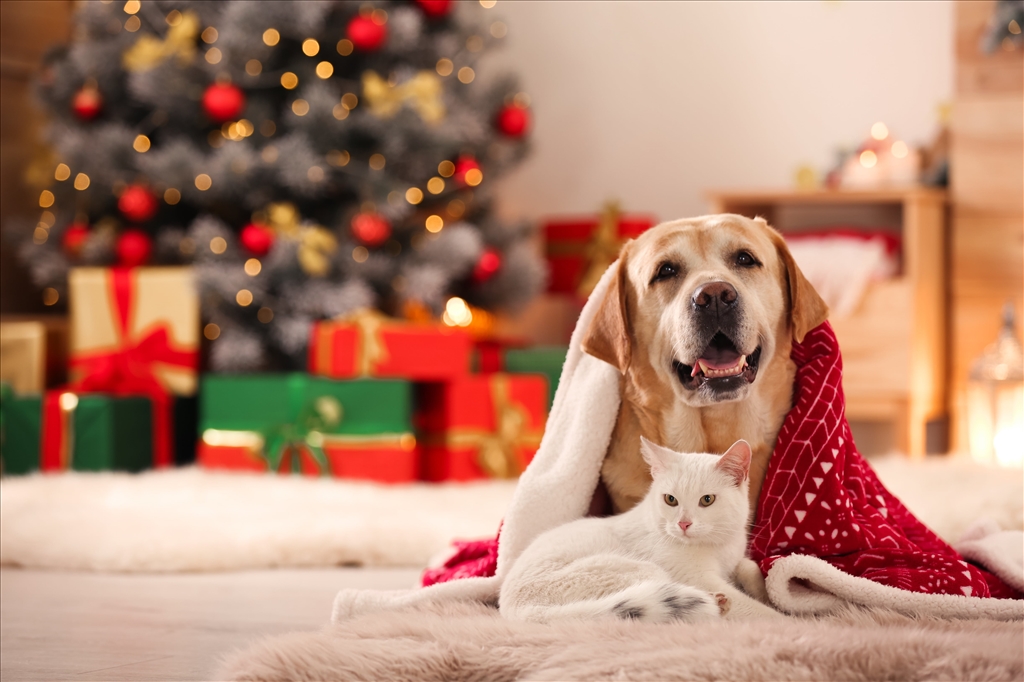Keeping Your Pet Safe at Christmas
 With just one week to go until Christmas Day, we’re all beginning to count down the days to when we can enjoy a well-deserved break. While there is much festive excitement in the air, we wanted to provide you with a little information on making sure your pet is kept safe and healthy during this time. From lots of delicious foods and sweets, to Christmas decorations and new toys, there are many hazards to keep in mind that could be potentially dangerous for your pet.
With just one week to go until Christmas Day, we’re all beginning to count down the days to when we can enjoy a well-deserved break. While there is much festive excitement in the air, we wanted to provide you with a little information on making sure your pet is kept safe and healthy during this time. From lots of delicious foods and sweets, to Christmas decorations and new toys, there are many hazards to keep in mind that could be potentially dangerous for your pet.
Our veterinary team has put together a short list for what you should keep your eye out for this Christmas!
Christmas Foods
Whilst they are delicious for humans, there are many Christmas treats that should not be shared with your pet – even if they give you ‘the begging eyes’.
- Chocolate – this contains theobromine which is incredibly toxic for both cats and dogs. Dark chocolate has much higher levels of theobromine. The side effects of pets ingesting chocolate range from diarrhoea, vomiting and hyperactivity and can in some cases be fatal.
- Christmas cake, mince pies and Christmas pudding – some of these items contain grapes, raisins and alcohol, and can be highly toxic to your pet. Often the symptoms of this range from diarrhoea, vomiting and increased urination and drinking.
- Sage and onion stuffing – onions, leek, garlic, shallots, spring onion and chive all belong to the allium family which can cause life threatening anaemia in your pet if consumed.
- Other foods such as macadamia nuts, blue cheese, alcohol, bones (especially cooked chicken and turkey), fatty and mouldy foods can be dangerous for your pet.
Christmas Decoration, Wrapping & Presents
If your pet has an inquisitive nature and also likes to lift things he or she shouldn’t, it’s important to be mindful of the decorations on your tree whether edible or not as they can be easily lifted, with the smaller parts consumed. On Christmas Day itself there will of course be a flurry of wrapping paper (in most cases you are unable to see the floor!) and its best to ensure that all pieces are cleaned up and not accidentally lifted by your pet as these can cause an obstruction in the stomach.
If your household is flooded with lots of new toys, some of which may require batteries, please also make sure not leave the batteries around in reach of your pet.
Anti-Freeze
On the colder days we will unfortunately have to reach for the anti-freeze to keep our cars running. It’s vital to take extra care when using this and to clean up any spillages immediately as this can be easily lapped up off the ground by your pet. It can be very tempting for pets due to its sweet taste but unfortunately this can be fatal for them. It’s also worth noting that some imported snow globes may contain anti-freeze so if you have any breakages in the house, make sure the spillage is cleaned as soon as possible.
Initial symptoms following the consumption of anti-freeze include diarrhoea, vomiting and weakness. Often the pet will then appear to recover however in a very short space of time they can suffer kidney failure with fatal consequences.
Festive Plants
Some plants brought into the house at Christmas such as holly, ivy, mistletoe and poinsettias can be toxic to pets, causing vomiting or mild skin irritations. If you do have these in the house, ensure that they are out of reach from your pet.
If you suspect that your pet has ingested something they were not supposed to, contact your vet immediately and provide as much of the following details as you can:
- What it has ingested
- How much they have been exposed to
- Exact time of incident
- Key symptoms and behaviours
Should you need the assistance of the USPCA Veterinary Team over the Christmas period, please contact us on 028 3025 1000.
We wish you and your pets a very Merry Christmas!
Back








